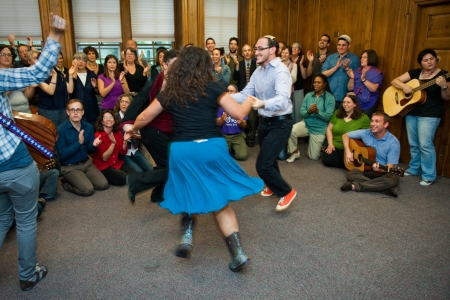This can be lead by either a transgender or non-transgender ritual leader, but has been written with inclusive pronouns such as “ours” or “ourselves” in the hopes that this linguistic move will not “other” the transitioning individual(s). If the leader is not comfortable with this, in the appropriate places, s/he might like to use “their” or “themselves” instead.
1. WELCOME & INTRODUCTION
Ritual Leader:
Welcome everyone, and Chag Sameach! A happy, joyous holiday.
We gather today to witness and celebrate the transition of (name of individual or names of individuals). Tu B’Av is a holiday of life, rebirth, and redemption. According to Jewish tradition, on Tisha B’Av, the 9th of the month of Av, G-d decreed that the Israelites would wander the desert for 40 years until the generation who knew slavery in Mitzrayim died out. Tu B’Av, the 15th of the month of Av, is the date some 40 years later, when G-d lifted the decree and permitted the remaining Israelites to enter the Promised Land. Tu B’Av celebrates the end of a mindset of oppression and a readiness to move forward.
Welcome everyone, and Chag Sameach! A happy, joyous holiday.
We gather today to witness and celebrate the transition of (name of individual or names of individuals). Tu B’Av is a holiday of life, rebirth, and redemption. According to Jewish tradition, on Tisha B’Av, the 9th of the month of Av, G-d decreed that the Israelites would wander the desert for 40 years until the generation who knew slavery in Mitzrayim died out. Tu B’Av, the 15th of the month of Av, is the date some 40 years later, when G-d lifted the decree and permitted the remaining Israelites to enter the Promised Land. Tu B’Av celebrates the end of a mindset of oppression and a readiness to move forward.
2. SONGS OF PRAISE
Ritual Leader (to all):
Please join me in singing. “My soul, praise G-d. I will praise G-d with my life” (Psalm 146).
הַלְלִי נַפְשִׁי, אֶת-יְהוָה
אֲהַלְלָה יְהוָה בְּחַיָּי
Halili nafshi et-Adonay
ahalilah Adonay bikhayay
ahalilah Adonay bikhayay
3. READING & REFLECTION
Ritual Leader:
Many transgender and genderqueer folks search for ourselves for many years, hoping one day to find a place in our bodies, in our lives and in this world where we are free to live a life gendered with all of its opportunities & promise. A Promised Land. The entry into this place is different from the miraculous coming out from Mitzrayim. In order to live our lives, we have had to find freedom, and often free our friends and family along with us, from narrow views of a G-d, and of a people created in G-d’s image as static and unchanging, male or female. Like the Israelites who stood at the base of Mount Sinai, although we received the Torah, we are not fully free to integrate and enact it. We search and we wander and sometimes it seems we won’t make it. Today, we celebrate (transitioning individual(s)’s) making it.
[Ritual Leader invites the transitioning individual(s) to join hi/er to speak about hi/er journey to transition, if desired. Instead of or after a personal reflection, a friend or important person in the life of the transitioning individual may be invited to share a reading or a poem with the assembled group. It may be particularly powerful to invite someone who has served as a trans guide or mentor for the individual. For a suggested reading, see the poem “Girl In a Bottle” by Joy Ladin in her book Coming to Life.]
GIRL IN A BOTTLE by Joy Ladin
You may have lost hope
But you are definitely a girl
Hope hasn’t lost. The almond, orphaned scent
Of adolescence braids
Your life with unwanted features,
Shaving your head,
Raising the shades
That kept you nice and protected,
Celebrating
Your year of being nude, a crystal skull
Extended to full-size
For everyone to see.
The restless young light
That is always on
Pearls the little secrets
Of your body, misting the habits
That strand you
In the mirror. Reality
Lines up to smooch,
Bites your fingernails,
Whispers the secret signs
That can get you into the best parties –
Or are they anxieties
That only look like parties? –
Bullying, taking full advantage
Of your metamorphosis
Into a girl you don’t even know. It’s time
To fill in the blanks.
Which makeup will you choose?
Which conscience? Which version of family
Will take your breath away?
Your arms, your legs,
Whisper the world you always wanted,
Fashioning conscience
From your body’s vulnerability.
You vowed to conceal
The hope whose strands
Made you real,
But you have been born
Into the streaming light of history,
A shyly confessional bliss,
Because you didn’t have to live,
Girl in a bottle,
And did.
You may have lost hope
But you are definitely a girl
Hope hasn’t lost. The almond, orphaned scent
Of adolescence braids
Your life with unwanted features,
Shaving your head,
Raising the shades
That kept you nice and protected,
Celebrating
Your year of being nude, a crystal skull
Extended to full-size
For everyone to see.
The restless young light
That is always on
Pearls the little secrets
Of your body, misting the habits
That strand you
In the mirror. Reality
Lines up to smooch,
Bites your fingernails,
Whispers the secret signs
That can get you into the best parties –
Or are they anxieties
That only look like parties? –
Bullying, taking full advantage
Of your metamorphosis
Into a girl you don’t even know. It’s time
To fill in the blanks.
Which makeup will you choose?
Which conscience? Which version of family
Will take your breath away?
Your arms, your legs,
Whisper the world you always wanted,
Fashioning conscience
From your body’s vulnerability.
You vowed to conceal
The hope whose strands
Made you real,
But you have been born
Into the streaming light of history,
A shyly confessional bliss,
Because you didn’t have to live,
Girl in a bottle,
And did.
4. OLD CLOTHES
Ritual Leader:
לֹא הַמֵּתִים, יְהַלְלוּ-יָהּ; וְלֹא, כָּל-יֹרְדֵי דוּמָה
וַאֲנַחְנוּ, נְבָרֵךְ יָהּ– מֵעַתָּה וְעַד-עוֹלָם
הַלְלוּ-יָהּ
Lo hamaytim yihalelu-Yah; v’lo kol yordey dumah
Va’anakhnu n’varekh Yah, mayatah v’ad olam halelu-Yah
Va’anakhnu n’varekh Yah, mayatah v’ad olam halelu-Yah
The dead do not praise G-d, nor do those who go down into silence.
But we will bless G-d from now until forever, halleluyah. (Psalm 115)
But we will bless G-d from now until forever, halleluyah. (Psalm 115)
Today we remember those who did not make it to the Promised Land and symbolically we reenact your rebirth, (Transitioning Individual(s)). We interweave your story with the story of our people, who, according to rabbinic legend (Lamentations Rabba, Prologue 13), would enact a ritual of death and rebirth each year for the 40 years when we wandered in the wilderness. On the eve of the 9th of Av, Moses would send a herald throughout the Israelites’ camp and announce: Go out to dig graves. The people would go out, dig graves and sleep in them. In the morning, Moses sent another herald saying: Separate the dead from the living. Then the people would arise and find their number diminished. In the last year of the forty years, the people enacted this ritual once more but found in the morning that none had died. Believing they had made a mistake in counting, they did the same thing on the tenth, eleventh, twelfth, thirteenth, fourteenth, and fifteenth, but still no one died. When the moon was full, they said it seems that the Holy One has annulled the decree from all of us, so they made the fifteenth a holiday.
On this 15th of Av, (Transitioning Individual(s)) symbolically prepares the final grave of hi/er wilderness travels to bury the old clothes that do not suit the woman/man/person s/he is becoming. As (Transitioning Individual(s)) takes hi/er old clothes and spreads them out in the box we have set aside for donations to charity, for tzedakah, we join arms together and we chant to pray for hi/er complete rebirth. When s/he has said hi/er final goodbye to those clothes, we welcome (transitioning individual(s)) back into our circle.
אָנָא אֵל נָא רְפָא נָא לָהּ
Ana el na,
Ana el na,
Ana el na,
r’fa na lah (lo)
Ana el na,
Ana el na,
r’fa na lah (lo)
Please G-d, heal hi/er.
Ritual Leader and Transitioning Individual(s):
Eternal One, my G-d, I cried out to You, and you healed me. (Psalm 30)
יְהוָה אֱלֹהָי– שִׁוַּעְתִּי אֵלֶיךָ, וַתִּרְפָּאֵנִי
Adonay elohay shviti elekha vatirpa’eyni
Adonay elohay shviti elekha vatirpa’eyni
5. BORROWED/NEW CLOTHES
Ritual Leader:
In the Mishnah (Taanit 26b), R. Simeon ben Gamliel tells us that the holidays of Tu B’Av and Yom Kippur were the two most joyous days in the calendar. On these days, Israelite women would wear borrowed white clothes, go out into the fields and seek a mate. They would borrow dresses so that one who didn’t have would not be shamed. In the fields, the women would dance together and tell potential suitors to pay special attention to a woman’s merits stemming not from her looks but from her family and her fear of G-d. Between the practice of trading clothes and the messages they shared with potential suitors, the Mishnah paints a picture of women helping each other to succeed in love and in life.
Today, (Transitioning Individual(s)), you wear new clothes, borrowed from the generosity of your friends, family and community who continue to support you through your transition. You look amazing, and your beauty comes not only from your good looks but also from your deep relationships.
Today, (Transitioning Individual(s)), you wear new clothes, borrowed from the generosity of your friends, family and community who continue to support you through your transition. You look amazing, and your beauty comes not only from your good looks but also from your deep relationships.
On the occasion of this gift, (Transitioning Individual(s)) gives thanks for the new garments:
בָּרוּךְ אַתָּה יְיָ אֱלֹהֵֽינוּ חֵי הָעוֹלָמִים, מַלְבִּישׁ עֲרֻמִים
Barukh Atah Adonay Eloheynu Melekh ha’olam malbish arumim.
Blessed are You, Eternal One, Our God, Ruler of the Universe, who clothes the naked.
6. SANCITIFCATION OF THE TRANSITION AND OF THE DAY
Ritual Leader:
Now that your symbolic rebirth is complete and your friends, family and community clothe you in the finery of their love and support, it is time to give thanks to the Holy One who Transforms.
(Transitioning Individual(s)) joins with others of us who have or are transitioning, to bless the Holy One who Transforms:
בָּרוּךְ אַתָּה אֲדֹנָי אֱלֹהֵינוּ מֶלֶךְ הָעוֹלָם הַמַּעֲבִיר אֶת הָעוֹבְרִים
Barukh Atah Adonay Eloheynu Melekh ha’olam hama’avir et ha’ovrim.
Blessed are You, Eternal One, our God, Ruler of Time and Space, the Transforming One
to those who transition/transform/cross over.
(Hebrew and English from Rabbi Elliott Rose Kukla)
Ritual Leader or an honored individual:
And we all mark the sanctity of this day with kiddush over wine (please rise):
בָּרוּךְ אַתָּה אֲדֹנָי אֱלֹהֵינוּ מֶלֶךְ הָעוֹלָם בּוֹרֵא פְּרִי הַגָפֶן
Barukh Atah Adonay Eloheynu Melekh ha’olam borey peri hagafen.
Blessed are You, Eternal One, Our G-d, Ruler of the Universe, who creates the fruit of the vine.
Transitioning Indivdiual(s) or Ritual Leader and all assembled say Shehekheyanu:
With thanks and gratitude for the good fortune to reach this important day:
בָּרוּךְ אַתָּה אֲדֹנָי אֱלֹהֵינוּ מֶלֶךְ הָעוֹלָם, שֶׁהֶחֱיָנוּ וְקִיְּמָנוּ וְהִגִּיעָנוּ לַזְּמָן הַזֶּה
Barukh Atah Adonay Eloheynu Melekh ha’olam, shehekheyanu, vekiyemanu, vehigi’anu lazeman hazeh.
Blessed are You, Adonay, our God, Ruler of the Universe, who has given us life, sustained us, and allowed us to reach this day.
7. SIMAN TOV U’MAZEL TOV. Y’HE LANU, U’LKHOL YISRAEL!
Time to dance!












